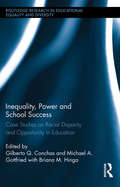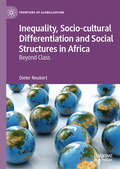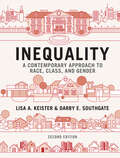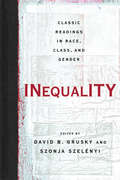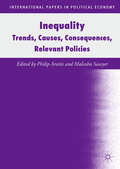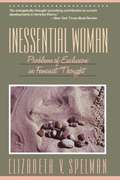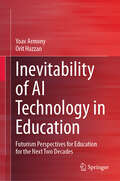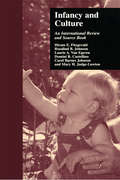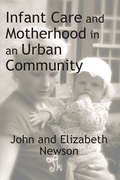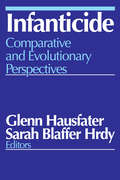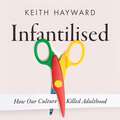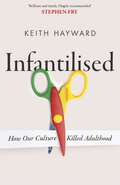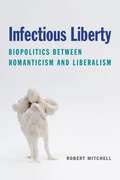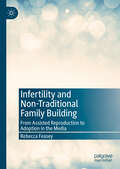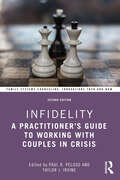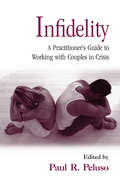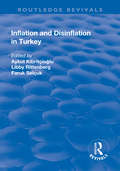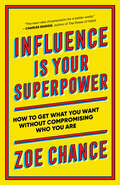- Table View
- List View
Inequality, Power and School Success: Case Studies on Racial Disparity and Opportunity in Education (Routledge Research in Educational Equality and Diversity)
by Michael Gottfried Gilberto ConchasThis volume highlights issues of power, inequality, and resistance for Asian, African American, and Latino/a students in distinct U.S. and international contexts. Through a collection of case studies it links universal issues relating to inequality in education, such as Asian, Latino, and African American males in the inner-city neighborhoods, Latina teachers and single mothers in California, undocumented youth from Mexico and El Salvador, immigrant Morrocan youth in Spain, and immigrant Afro-Caribbean and Indian teenagers in New York and in London. The volume explores the processes that keep students thriving academically and socially, and outlines the patterns that exist among individuals—students, teachers, parents—to resist the hegemony of the dominant class and school failure. With emphasis on racial formation theory, this volume fundamentally argues that education, despite inequality, remains the best hope of achieving the American dream.
Inequality, Socio-cultural Differentiation and Social Structures in Africa: Beyond Class (Frontiers of Globalization)
by Dieter NeubertThis book contends that conventional class concepts are not able to adequately capture social inequality and socio-cultural differentiation in Africa. Earlier empirical findings concerning ethnicity, neo-traditional authorities, patron-client relations, lifestyles, gender, social networks, informal social security, and even the older debate on class in Africa, have provided evidence that class concepts do not apply; yet these findings have mostly been ignored.For an analysis of the social structures and persisting extreme inequality in African societies – and in other societies of the world – we need to go beyond class, consider the empirical realities and provincialise our conventional theories. This book develops a new framework for the analysis of social structure based on empirical findings and more nuanced approaches, including livelihood analysis and intersectionality, and will be useful for students and scholars in African studies and development studies, sociology, social anthropology, political science and geography.
Inequality: A Contemporary Approach to Race, Class, and Gender
by Lisa A. Keister Darby E. SouthgateInequality: A Contemporary Approach to Race, Class, and Gender offers a comprehensive introduction to the topics animating current sociological research focused on inequality. Contemporary, engaging, and research-oriented, it is the ideal text to help undergraduate students master the basic concepts in inequality research and gain a deeper understanding of the ways in which race, class, and gender interact with systems of social stratification. Following an introduction to theories and research methods used in the field, the authors apply these concepts to areas that define inequality research, including social mobility, education, gender, race, and culture. The authors include up-to-date quantitative evidence throughout. The text concludes by examining policies that have facilitated inequality and reviewing the social movements that in turn seek to reshape those structures. Though primarily focused on the United States, it includes a chapter on stratification across the globe and draws on cross-national comparisons throughout.
Inequality: Classic Readings in Race, Class, and Gender (Studies In Social Inequality Ser. #71)
by David GruskyThis book redirects the focus of public debate to issues of gender and racial segregation and suggests that they should be fundamental to thinking about the status of black Americans and the origins of the urban underclass. It is a starting point for students and advanced scholars of inequality.
Inequality: Trends, Causes, Consequences, Relevant Policies (International Papers In Political Economy Ser.)
by Philip Arestis Malcolm SawyerThis book is the fifteenth volume in the renowned International Papers in Political Economy (IPPE) series which explores the latest developments in political economy. Containing contributions by experts in the field, this book focuses on topics that address the ongoing debate of inequalities in economic systems. Inequality has been considered a problem by many academics and policy makers for a long time now and recently here has been some evidence of increasing inequalities in society. Contributors to this book focus on the causes and consequences of inequality along with the importance of tackling inequality and recommend potential policies to reduce it, for example tax reforms. The book covers different aspects of inequality - from income to gender - and explores links between inequality and economic growth, and financialisation and financial crisis.
Inequality: What Inequality Means, Its Impact And How We Can Help The World Become More Equal (What Can We Do? #4)
by Katie DickerA look at one of the biggest challenges facing our world today - inequality - and how we are tackling itWe are all unique human beings, with different talents and skills. As we go through life, our experiences shape who we are. But sometimes the different paths we take are caused by inequality - not being treated fairly, because of where we are born, our health or abilities or even the colour of our skin. And this may wrongly affect how healthy, wealthy or educated we are able to become.How can we build a better, fairer, more equal, cleaner world? This series seeks to answer this by exploring some of the greatest challenges facing our planet today - from disease to conflict, and from the energy crisis to the plight of refugees. It explains what is already being done to meet and tackle these challenges, and explores what more could and should be done, both individually and collectively, to ensure a better future for our planet, its people and its wildlife.Taking a positive, but realistic perspective, this series aims to empower young readers by helping them understand these complex and troubling issues, calm their anxieties, and promote empathy and understanding for the many millions of people suffering from for example, poverty or inequality.Perfect for readers aged 9 and upTitles in the series:Climate ChangeDiseaseInequalityMigrationPoverty & Food InsecurityWar & Conflict
Inequities and Quality of Life in Argentina: Geography and Quality of Life in Argentina (The Latin American Studies Book Series)
by Juan Pablo Celemin Guillermo VelázquezThe basis of this proposal is the study of quality of life from an interdisciplinary perspective. This volume presents a set of contributions from different sciences that analyse the quality of life in Argentina. The contributions come from the social disciplines (Geography, Economics, Demography, History) and from the field of health (Nutrition, Medicine, Psychology) as well as the applied sciences (Statistics, Applied Mathematics). The purpose is to present various dimensions related to the well-being of the population, particularly in relation to poverty, human development, health, nutrition and morbidity. Although there are works from different sciences associated with the object of study, they all have a geographic component based on cartography. Consequently, the importance of geography is highlighted, as the territorial base allows for the study quality of life from a unique perspective where the map emerges as a fundamental descriptive tool. Such an approach is useful to diagnose the quality of life and its uneven spatial distribution, either through index or different associated variables. Thus, the maps are fundamental to study the territorial configuration of the quality of life at the different scales of analysis, showing spatial inequalities and the areas where it is necessary to take measures to improve the population's living conditions.
Inequity in The Technopolis: Race, Class, Gender, and the Digital Divide in Austin
by Joseph StraubhaarOver the past few decades, Austin, Texas, has made a concerted effort to develop into a “technopolis,” becoming home to companies such as Dell and numerous start-ups in the 1990s. It has been a model for other cities across the nation that wish to become high-tech centers while still retaining the livability to attract residents. Nevertheless, this expansion and boom left poorer residents behind, many of them African American or Latino, despite local and federal efforts to increase lower-income and minority access to technology. This book was born of a ten-year longitudinal study of the digital divide in Austin—a study that gradually evolved into a broader inquiry into Austin’s history as a segregated city, its turn toward becoming a technopolis, what the city and various groups did to address the digital divide, and how the most disadvantaged groups and individuals were affected by those programs. The editors examine the impact of national and statewide digital inclusion programs created in the 1990s, as well as what happened when those programs were gradually cut back by conservative administrations after 2000. They also examine how the city of Austin persisted in its own efforts for digital inclusion by working with its public libraries and a number of local nonprofits, and the positive impact those programs had.
Inessential Woman: Problems Of Exclusion In Feminist Thought
by Elizabeth V. SpelmanThroughout history, Western philosophers have buried women's characters under the category of "men's nature. " Feminist theorists, responding to this exclusion, have often been guilty of this exlcusion as well - focusing only on white, middle-class women and treating others as inessential. Inessential Woman is an eloquent argument against white, middle-class bias in feminist theory. It warns against trying to seperate feminist thinking and politics from issues of race and class, and challenges the assumption of homogeneity that underlies much of feminist thought.
Inevitability of AI Technology in Education: Futurism Perspectives for Education for the Next Two Decades
by Orit Hazzan Yoav ArmonyThis book layouts historic and future perspectives at the introduction of technology into education systems: On the one hand, the book attempts to explain why despite numerous attempts, technology has struggled to integrate successfully into the education system for over a century; on the other hand, it explores whether this trend will persist in the foreseeable future, questioning if emerging technologies, like virtual reality or Gen-AI will ever be embraced by education systems worldwide, and introducing a hypothesis that these technologies will become inevitable so that education systems will have a little choice in adopting them. The underlying perspective is that education systems need to prepare for this new future and better start doing so now. The book encompasses three key areas: education, technology, and future studies, with a focus on how technology will shape the future of education. It begins by examining past failures of integrating technology into education, analyzing the reasons behind these setbacks. It progresses to assess the potential integration of future technologies (10-20 years from now), exploring a feasible scenario and the force implications on learning, teachers, and the system. Examining recent attempts to implement technology in education reveals numerous reasons for failure. A significant contributing factor appears to be inherent conflicts within the education system's fundamental structure. These conflicts, involving goals, curricula, organizational structure, pedagogy, and student management, prevent the system from embracing reforms or new technologies. Envisioning a future where technology will deeply 'know' the students, 'sense' their environment, 'understand' the context and the situation, 'explain' and 'advise' them on the best suitable behavior or activity, the book anticipates applications in education ranging from ensuring personal safety and health to enhancing knowledge acquisition and decision-making. As the book explores the potential inevitability of technology in education, it recognizes the transformative impact on teachers and students and outlines possible desire scenario to aid in preparation, such as, personalized education to better suit student's capabilities, needs, and desires; how to motivate students to learn in an environment where all tasks can be done by machines; ethical issues; the new role of the school, the educator, and the system, etc. This book is especially suitable for teachers, educators, public officials, and anyone interested in the future of education.
Infancy and Culture: An International Review and Source Book (Reference Books On Family Issues Ser.)
by Hiram E. Fitzgerald Rosalind B. Johnson Laurie A. Egeren Domini R. Castellino Carol Barnes Johnson Mary Judge-LawtonInfancy and Culture: An International Review and Source Book provides a cross-indexed, annotated guide to social and behavioral studies of infants of color. Derived from five major data bases of published scientific literature, this volume was designed to elevate the scientific study of infants of color to a level reflecting their majority status in the world's population. While the vast majority of the world's infants are infants of color, a scan of 175 journals only resulted in 386 studies. This crisply underscores the need to intensify studies of cross-culture and within-culture variability, in order to broaden our understanding of the cultural impact on social and behavioral development during the first few years of human life. Infancy and Culture takes a small step in that direction by cataloging the extant literature by geographic region, and by cross-indexing it by topical content. Citations are numbered consecutively throughout the text and both author and subject indexes are pegged to the citation number, not to page numbers, thereby facilitating one's search for all published literature related to a particular topic. Finally, the editors provide a brief summary of the research for each chapter in the volume.
Infant Care and Motherhood in an Urban Community
by John Elizabeth NewsonInfant Care and Motherhood in an Urban Community investigates the behavior and attitudes of 709 mothers towards their year-old babies. John and Elizabeth Newson, impatient with the voluminous and contradictory literature telling parents how their children should be brought up, decided to find out how they were being brought up. Infant Care in an Urban Community is focused on sources of advice that influence parents, how they feel about their children, and how they react to situations in handling young babies.Infant handling today is still a subject on which many different specialists use the full weight of their professional authority to back up their private prejudices concerning what is good and what is bad in the care of young children. In the face of the conflict which results, intelligent parents are rapidly forced to the conclusion that the experts know little more about the matter than they do themselves. The truth is that in the present state of knowledge there is not a sufficient body of well-substantiated evidence about the facts and consequences of child rearing on which to base sound practical advice to parents. This is where this book comes in. It shows that much of the advice offered is often out of touch with the practical needs, circumstances, and beliefs of the ordinary mother.Few theories of child rearing have been subjected to the inconvenience of being reconciled with the empirical evidence. This is the first study which has obtained information of this sort from a large and representative sample of mothers, and which has investigated the behavior of both mother and baby aehere and now' rather than relying on fond maternal memories. A special feature is the use of tape-recorded interviews which has allowed extensive quotation of their mothers' own opinions.
Infanticide: Comparative and Evolutionary Perspectives
by Sarah Blaffer Hrdy Glenn HausfaterRecent field studies of a variety of mammalian species reveal a surprisingly high frequency of infanticide - the killing of unweaned or otherwise maternally dependent offspring. Similarly, studies of birds, fish, amphibians, and invertebrates demonstrate egg and larval mortality in these species, a phenomenon directly analogous to infanticide in mammals. In this collection, Hausfater and Hrdy draw together work on animal and human infanticide and place these studies in a broad evolutionary and comparative perspective.Infanticide presents the theoretical background and taxonomic distribution of infanticide, infanticide in nonhuman primates, infanticide in rodents, and infanticide in humans. It examines closely sex allocation and sex ratio theory, surveys the phylogeny of mammalian interbirth intervals, and reviews data on sources of egg and larval mortality in a variety of invertebrate and lower vertebrate species. Dealing with infanticide in nonhuman primates, two chapters critically examine data on infanticide in langurs and its broader theoretical implications. By reviewing sources of infant mortality in populations of small mammals and new laboratory analyses of the causes and consequences of infanticide, this work explores such issues as the ontogeny of infanticide, proximate cues of infants and females which elicit infanticidal behavior in males, the genetical basis of infanticide, and the hormonal determinants.Hausfater and Sarah Blaffer Hrdy, through their selection of materials for this book, evaluate the frequency, causes, and function of infanticide. Historical, ethnographic, and recent data on infanticide are surveyed. "Infanticide" summarizes current research on the evolutionary origins and proximate causation of infanticide in animals and man. As such it will be indispensable reading for anthropologists and behavioral biologists as well as ecologists, psychologists, demographers, and epidemiologists.
Infantilised: How Our Culture Killed Adulthood
by Keith J. HaywardA SHREWD AND TIMELY EXPLORATION OF A CULTURAL LANDSCAPE PREDICATED ON THE PRIMACY OF YOUTHHave you ever noticed that in areas of everyday life, rather than being addressed like a mature adult, you're increasingly treated like an irresponsible child in constant need of instruction and protection?Noticing society's creeping descent into infantilisation is one thing, however understanding the roots and causes of the phenomenon is not quite so easy. But in this topical and vitally important new work, cultural theorist and academic, Dr Keith Hayward, exposes the deep social, psychological and political dangers of a world characterised by denuded adult autonomy.But importantly Infantilised is no one-dimensional, unsympathetic critique. Brimming with anecdotes and examples that span everything from the normalisation of infantilism on reality TV to the rise of a new class of political 'infantocrat', this comprehensive book also offers an insightful and at times humorous account of infantilism's seductive appeal, and details some suggestions for avoiding some of the pitfalls associated with our increasingly infantilised world.
Infantilised: How Our Culture Killed Adulthood
by Keith J. HaywardInfantilised: How Our Culture Killed Adulthood is the definitive grown-up's guide to a cultural landscape predicated on the primacy and constancy of youth.
Infantilised: How Our Culture Killed Adulthood
by Keith J. HaywardInfantilised: How Our Culture Killed Adulthood is the definitive grown-up's guide to a cultural landscape predicated on the primacy and constancy of youth.
Infectious Liberty: Biopolitics between Romanticism and Liberalism (Lit Z)
by Robert MitchellInfectious Liberty traces the origins of our contemporary concerns about public health, world population, climate change, global trade, and government regulation to a series of Romantic-era debates and their literary consequences. Through a series of careful readings, Robert Mitchell shows how a range of elements of modern literature, from character-systems to free indirect discourse, are closely intertwined with Romantic-era liberalism and biopolitics. Eighteenth- and early-nineteenth century theorists of liberalism such as Adam Smith and Thomas Malthus drew upon the new sciences of population to develop a liberal biopolitics that aimed to coordinate differences among individuals by means of the culling powers of the market. Infectious Liberty focuses on such authors as Mary Shelley and William Wordsworth, who drew upon the sciences of population to develop a biopolitics beyond liberalism. These authors attempted what Roberto Esposito describes as an “affirmative” biopolitics, which rejects the principle of establishing security by distinguishing between valued and unvalued lives, seeks to support even the most abject members of a population, and proposes new ways of living in common.Infectious Liberty expands our understandings of liberalism and biopolitics—and the relationship between them—while also helping us to understand better the ways creative literature facilitates the project of reimagining what the politics of life might consist of.Infectious Liberty is available from the publisher on an open-access basis.
Infektionen und Gesellschaft: COVID-19, frühere und zukünftige Herausforderungen durch Pandemien
by Ansgar W. LohseIn diesem Open Access Tagungsband beantworten renommierte Wissenschaftlerinnen und Wissenschaftler hochaktuelle Fragen zu Pandemien im Allgemeinen und der COVID-19-Pandemie im Besonderen. Vor allem die Auswirkungen auf unsere Gesellschaft stehen im interdisziplinären Fokus. Wie wirken Infektionserreger auf Körper und Psyche? Wie wirken Pandemien auf Städte und Demokratien? Beeinflussen mediale Diskurse und Seuchennarrative die Impfbereitschaft? Kann es eine Güterabwägung zwischen Gesundheitsschutz und Wirtschaftswachstum geben? Verletzen Lockdown und Maskenpflicht die Grundrechte? Auf dem Symposium Infektionen und Gesellschaft der Akademie der Wissenschaften in Hamburg postulierte Professor Ansgar W. Lohse: „Das Coronavirus hat uns nicht gänzlich überrascht: Die Gefahr katastrophaler Pandemien hat immer schon existiert und wächst weiter. Umso wichtiger ist es, dass wir aus der Vergangenheit für die Zukunft lernen.“ Der vorliegende Band bietet nicht nur eine interdisziplinäre Auseinandersetzung mit SARS-CoV-2 und den gesellschaftlichen Folgen, sondern auch einen Ausblick, wie wir in Zukunft mit Pandemien umgehen können – von der Prävention über die Entwicklung von Impfstoffen und Impfstrategien bis zu Therapiemöglichkeiten.
Inferno: An Anatomy of American Punishment
by Robert A. FergusonAn Open Letters Monthly Best Nonfiction Book of the YearAmerica’s criminal justice system is broken. The United States punishes at a higher per capita rate than any other country in the world. In the last twenty years, incarceration rates have risen 500 percent. Sentences are harsh, prisons are overcrowded, life inside is dangerous, and rehabilitation programs are ineffective. Looking not only to court records but to works of philosophy, history, and literature for illumination, Robert Ferguson, a distinguished law professor, diagnoses all parts of a now massive, out-of-control punishment regime.“If I had won the $400 million Powerball lottery last week I swear I would have ordered a copy for every member of Congress, every judge in America, every prosecutor, and every state prison official and lawmaker who controls the life of even one of the millions of inmates who exist today, many in inhumane and deplorable conditions, in our nation’s prisons.”—Andrew Cohen, The Atlantic“Inferno is a passionate, wide-ranging effort to understand and challenge…our heavy reliance on imprisonment. It is an important book, especially for those (like me) who are inclined towards avoidance and tragic complacency…[Ferguson’s] book is too balanced and thoughtful to be disregarded.”—Robert F. Nagel, Weekly Standard
Infertility and Non-Traditional Family Building: From Assisted Reproduction to Adoption in the Media
by Rebecca FeaseyThis book examines the representation of infertility, assisted reproduction, miscarriage, adoption and surrogacy in a wide range of media, including blogs, vlogs, social media posts and factual programming. In so doing, it illustrates how pregnancy loss, involuntary childlessness and non-traditional mothering are being depicted across the media landscape. Whilst the topic of motherhood has emerged as a significant area of academic debate, narratives of unsuccessful or unconventional mothering have remained largely absent, even at a time when there is a growing conversation about infertility online. Timely, pertinent and original, the book demonstrates the importance of a broader and more informed cultural discussion about fertility and family building.
Infidelity: A Practitioner’s Guide to Working with Couples in Crisis (Family Systems Counseling: Innovations Then and Now)
by Paul R. Peluso Taylor J. IrvineThis second edition brings together an impressive array of experts to discuss and provide understanding to the treatment of infidelity.Bringing together voices from a range of disciplines and backgrounds, including couples therapy, family therapy, evolutionary psychology, relational research, and more, Peluso and Irvine help therapists understand and practically treat this common and complex issue. Divided into three parts, chapters begin by laying the foundations for understanding why couples commit infidelity before looking at different treatments, such as Gottman Method Couples Therapy, models of fidelity and forgiveness, and other integrative approaches. This new edition includes brand-new material on topics such as nonmonogamy, teletherapy, cyber-infidelity, and the impact of infidelity on couples and families from different social, cultural, generational, and sexual perspectives.With revised referrals and resources at the end of each chapter; additional infidelity treatment methods; and examinations of gender, race, and power, this guide is essential reading for all practicing and training marriage and family therapists, counselors, psychotherapists, and social workers.
Infidelity: A Practitioner’s Guide to Working with Couples in Crisis (Routledge Series on Family Therapy and Counseling)
by Paul R. PelusoWhen one partner in a relationship is unfaithful to the other, it takes a lot of work by both parties involved to salvage the relationship. In today’s therapy-friendly climate, marriage/couples counseling is often a part of that rebuilding process. Many couples seek out professional therapy after an affair is out in the open, but often the act of infidelity is revealed while uncovering and discussing unrelated issues for which the couple is in counseling. And yet, amazingly, as common as this complex and difficult topic arises in therapy, there is relatively little professional literature devoted to understanding and "treating" infidelity. In this volume, Paul Peluso has assembled a truly impressive list of contributors from a range of disciplines and backgrounds, including marital therapy, family therapy, evolutionary psychology, marriage research, and cyberstudies, with the aim of filling this void.
Infiel
by Wednesday MartinWednesday Martin nos proyecta desde una perspectiva personal y científica algunos temas que han estado castigados por la sociedad durante siglos: la infidelidad, la monogamia, la lujuria, las mujeres y el sexo.Una visualización moderna que muestra la diferencia entre la sexualidad masculina y la femenina que teme a las consecuencias construidas por la sociedad a través de entrevistas realizadas a expertos y mujeres reales que han experimentado de cerca la monogamia y la infidelidad. Infiel, es una mirada fascinante a la sexualidad femenina que puede alejarnos de nuestra zona de confort y sin duda cambiará nuestra forma de pensar acerca del sexo y las mujeres para siempre.
Inflation and Disinflation in Turkey (Routledge Revivals)
by Libby Rittenberg Aykut Kibritçioǧlu Faruk SelçukThis title was first published in 2002. Since the 1990s Turkey has experienced a number of disasters, both physical and economic. The result has been a decrease in economic performance compared to other European states. This study addresses the country's ongoing economic struggles.
Influence Is Your Superpower: The Science of Winning Hearts, Sparking Change, and Making Good Things Happen
by Zoe ChanceRediscover the superpower that makes good things happen, from the professor behind Yale School of Management's most popular class &“The new rules of persuasion for a better world.&”—Charles Duhigg, author of the bestsellers The Power of Habit and Smarter Faster Better You were born influential. But then you were taught to suppress that power, to follow the rules, to wait your turn, to not make waves. Award-winning Yale professor Zoe Chance will show you how to rediscover the superpower that brings great ideas to life.Influence doesn&’t work the way you think because you don&’t think the way you think. Move past common misconceptions—such as the idea that asking for more will make people dislike you—and understand why your go-to negotiation strategies are probably making you less influential. Discover the one thing that influences behavior more than anything else. Learn to cultivate charisma, negotiate comfortably and creatively, and spot manipulators before it&’s too late. Along the way, you&’ll meet alligators, skydivers, a mind reader in a gorilla costume, Jennifer Lawrence, Genghis Khan, and the man who saved the world by saying no. Influence Is Your Superpower will teach you how to transform your life, your organization, and perhaps even the course of history. It&’s an ethical approach to influence that will make life better for everyone, starting with you.
